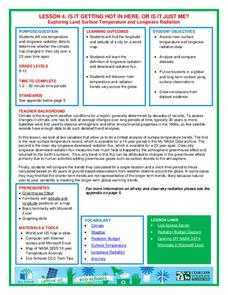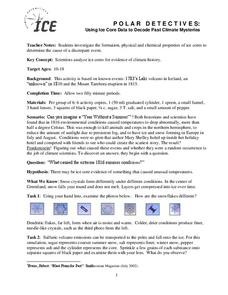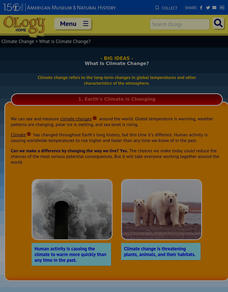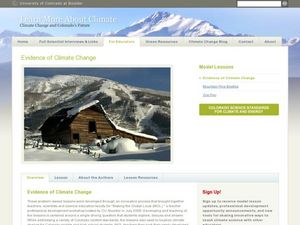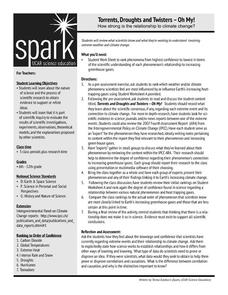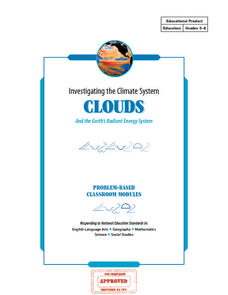National Wildlife Federation
Hot, Hotter, Hottest: Extreme Weather's Impact on Our Resources
How dry is it? It's so dry, the river only runs twice a week! Through an analysis of maps and discussions, pairs learn about droughts across the United States in the ninth of 12 lessons. They then read about, answer questions, analyze...
Curated OER
Weather Watchers
Students identify basic weather instruments and how they are used to record weather data. Students define several vocabulary terms as stated in lesson. Students use basic instruments to record weather data in their area. Students use the...
National Wildlife Federation
Is It Getting Hot in Here, or Is It Just Me?
Currently, only 2.1% of global warming is felt on continents, while over 93% is felt in the oceans. The fourth lesson in the series of 21 on global warming is composed of three activities that build off one another. In the first...
American Museum of Natural History
Take the Climate Quiz
Climate and weather are often confused. Pupils answer questions online to review concepts related to climate and weather changes. They get immediate feedback and additional facts with each question. The lesson is appropriate as a remote...
Cambridge English
Words Related to Weather: Vocabulary Activities
Study all things weather with a packet of weather vocabulary activities. The 12-page packet includes three crosswords varying in difficulty, a mixed letter sort, a sentence sort, weather word search, and fill-in-the-blank sentences with...
Office of the New Jersey State Climatologist
Play Ball! – Or Not…Making a Decision Using Weather Data
Should the game go on or not? An engaging instructional activity asks small groups to make a decision using weather data. After analyzing a map, an updated forecast, and radar information, groups have to decide whether to cancel a...
World Wildlife Fund
Land of the Midnight Sun
From days of 24 hour sunlight, to endless nights that last for days, the Arctic is a very unique place to live. Examine the seasonal changes that occur in the northern-most reaches of the globe and the impact they have on the plants and...
Polar Trec
Polar Detectives: Using Ice Core Data to Decode Past Climate Mysteries
How does examining an ice core tell us about weather? Learners set up and explore fake ice cores made of sugar, salt, and ash to represent historical snowfall and volcanic eruptions. From their setups, scholars determine what caused the...
American Museum of Natural History
What Is Climate Change?
So many factors show that climate change has arrived. Learners read through an online resource that explains the data and the consequences of climate change. They also review strategies for slowing or even reversing the global influence.
Curated OER
The Potential Consequences of Climate Variability and Change
Students analyze the impact of climate variability and change utilizing a broad span of topics over a wide range of grade levels. This three lesson unit is easily adapted for the various instructional levels listed.
National Wildlife Federation
Why All The Wiggling on the Way Up?
Some of the CO2 emitted by burning fossil fuels is removed from the atmosphere by natural sinks, such as the ocean. The fifth engaging instructional activity in the series of 21 examines the CO2 data from three very different locations....
UAF Geophysical Institute
Observing the Weather
How can you predict the weather without any technology? Young scientists learn to forecast the weather using traditional Native American techniques. Based on their observations of the weather, as well as talking to their classmates, they...
PBS
Investigating Daily and Seasonal Weather
Talking about weather isn't just for making conversation. Young scientists gather evidence from an interactive activity to make connections between daily and seasonal weather. They analyze data from different areas and compare the...
Curated OER
Weather History
Young scholars study how weather is measured. In this climate lesson plan, students research how samples of the ocean floor reveal facts about the climate thousands of years ago. Young scholars use clay samples to create layers that...
Curated OER
Evidence of Climate Change
Sixth graders examine climate change in the state of Colorado. In this climate lesson, 6th graders watch 2 video clips regarding the topic and research the subtopics- snow pack, precipitation, temperature, forest fires, river flow,...
Center Science Education
Torrents, Droughts, and Twisters - Oh My!
What is causing the extreme weather happening around the planet? Middle and high schoolers read about climate change as a possible link to such phenomena. Then they form groups to discuss and research one of the types of weather events....
National Wildlife Federation
When It Rains It Pours More Drought and More Heavy Rainfall
Which is worse — drought or flooding? Neither is helpful to the environment, and both are increasing due to climate change. The 16th lesson in a series of 21 covers the average precipitation trends for two different climates within the...
PBS
Ocean Circulation in the North Atlantic
Swirling and churning, the waters of the North Atlantic play a vital role in Earth's climate! Discover the many factors that produce circulation using a multimedia lesson from PBS's Weather and Climate series for high schoolers. Scholars...
Curated OER
Investigating the Climate System - Clouds
Here is a fabulous lesson on the Earth's radiant energy system. This amazing, 31-page document is chock-full of great activities, worksheets, lab sheets, quizzes, rubrics, and assessments. Learners model and explain cloud formation,...
Curated OER
Climate Mime-it
Learners pantomime new climate vocabulary words. In this climate lesson, students go over new vocabulary words and their meanings. Learners form groups and pantomime these word's definitions.
PBS
Breaking it Down
After challenging themselves to correctly choose the form of erosion and length of time required for a given landform to develop, earth science class members model mechanical and chemical weathering with various lab demonstrations over...
Chicago Botanic Garden
Climate Change Around the World
It is unknown if cloud cover increases in response to carbon dioxide levels changing, helping climate change slow down, or if cloud cover decreases, allowing Earth to warm faster. Part four in the series of five lessons has classes...
Chicago Botanic Garden
Historical Climate Cycles
Scientists use ice core samples to obtain temperatures of the earth from 400,000 years ago! The third of five lessons instructs pupils to interpret historical climate data to see changes over time. In part I, participants interpret...
Chicago Botanic Garden
Causes and Effects of Climate Change
It's time for your class to literally show what they know! Pupils illustrate what they learned about the causes and effects of climate change by filling out a graphic organizer to complete the 5-part series of lessons. They discuss them...




